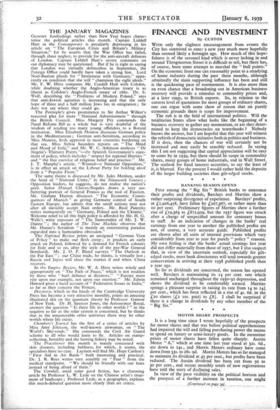THE JANUARY MAGAZINES GLOOMY forebodings rather than New Year hopes
charac- terise the political articles this month. Captain Liddell Hart in the Contemporary is peculiarly depressing in his article on " The European Crisis and Britain's Military Situation," for he asserts that the War Office has failed, through sheer neglect, to provide for the anti-aircraft defences of London. Captain Liddell Hart's severe comments on our diplomacy may be questioned. But if he is right in saying that London was virtually defenceless in September, the Foreign Office could hardly have taken a strong line. Lord Noel-Buxton pleads for " Settlement with Germany," appa- rently on condition that she will " champion the right ideals." Mr. F. W. Hirst compares Mr. Cordell Hull with Cobden, while doubting whether the Anglo-American treaty is as liberal as Cobden's Anglo-French treaty of 186o. Dr. S. Wolf, describing the " Problems of Modem Poland," says that anti-Jewish agitation is increasing and that the only hope of three and a half million Jews lies in emigration ; he does not say where they could go.
The Fortnightly gives prominence to Sir Arthur Willert's reasoned plea for more " National Advertisement " through the British Council. Miss Margery Fry commends the Penal Reform Bill as a whole but is very doubtful of the wisdom of sending too many young offenders to a Borstal institution. Miss Elizabeth Monroe discusses German policy in the Mediterranean ; German anti-Semitism, according to Miss Monroe, finds approval in most countries bordering on that sea. Miss Sylvia Saunders reports on " The Mind and Mood of Italy," and Mr. W. C. Atkinson analyses " Dr Negrin's Thirteen Points "—the Spanish Government's state- ment of policy, which includes " respect for regional liberties " and " the free exercise of religious belief and practice." Mr. J. T. Murphy's article, " Wanted—a National Opposition," is in effect an attack on the Labour Party for holding aloof from a " Popular Front."
The same theme is discussed by Mr. Jules Menken, under the head of " National Unity," in the Nineteenth Century ; Opposition leaders, he suggests, do not realise the nation's peril. Senor Manuel Chaves-Nogales draws a very un- flattering portrait of General Franco as the tool of Fascism. Mr. Graham Hutton discusses " The Economic Conse- quences of Munich " as giving Germany control of South Eastern Europe, but admits that the small nations may not after all slavishly accept Nazi orders. . Mr. Basil Paneyko writes instructively on " Germany, Poland and the Ukraine." Welcome relief to all this high policy is afforded by Mr. H. G. Wells's witty exposure of " The Immortality of Mr. J. W. Dtinne " ; the author of The Time Machine observes that Mi. Dunne's Serialism " is merely an entertaining paradox expanded into a humourless obsession."
The National Revieth .prints an unsigned " German View of Policy " to make our flesh • creep ; it predicts an early attack on Poland, followed by a demand for French colonies for Italy and so on, after the style of the pre-War General Bernhardi. Mr. J. 0. P. Bland surveys " The Outlook in the Far East " ; our China trade, he thinks, is virtually lost ; Russia and Japan will share the market if and when China recovers.
In the Empire Review, -Mr. W. A. Hirst writes wisely and appropriately on " The Path of Peace," which is not trodden by those who " hurl defiance at dictators." " Europe must rely upon our example, not upon our exertion." Mr. Edwin Haward gives a lucid account of " Federation Issues in India," so far as they concern the Princes.
Discovery, which in the hands of the Cambridge University Press has become a very attractive monthly, prints an amusing illustrated skit on the quantum theory by Professor Gamow of New York. Dr. H. Spenser Jones, the Astronomer Royal, answers the question " Is there life in other worlds ? " in the negative so far as the solar system is concerned, but he thinks that in the innumerable other universes there may be other worlds where life exists.
Chambers's Journal has the first of a series of articles by Miss Amy Johnson, the well-known airwoman, on " The World's Sky-roads." She commends the Civil Air Guard scheme to all who would learn to fly. Articles on stamp- collecting, heraldry and the herring fishery may be noted.
The Practitioner this month is mainly concerned with skin diseases, including baldness, for which, it seems, the specialists have no cure. Laymen will find Mr. Hope Carlton's " First Aid in Air Raids " both interesting and practical. Dr. J. R. Rees writes -very sensibly on " Fear " from the medical standpoint. " We should be friendly with our fears instead of being afraid of them."
The Cornhill, amid some good fiction, has a charming article by Professor L. W. Lyde on the Chinese artist's treat- ment of landscape ; Professor Lyde, as a geographer, explains this much-debated question more clearly than art critics.










































 Previous page
Previous page